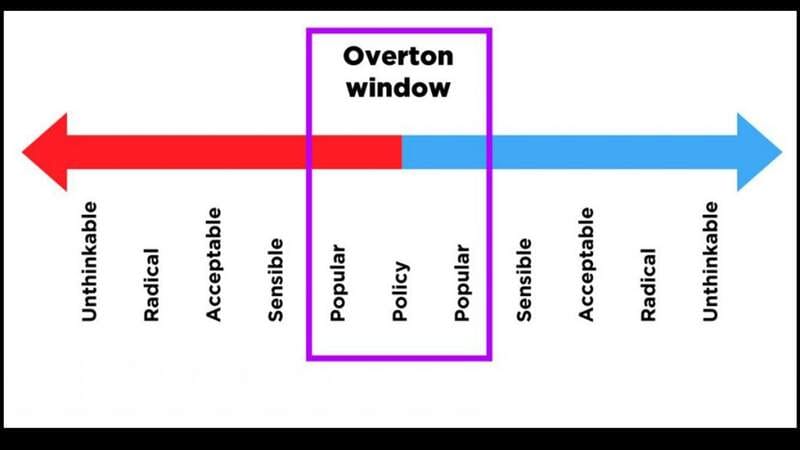Roaming death squads or climate justice - the future will be what we make it

If in 2020 you had said that by 2025 masked agents would be kidnapping thousands of people off US streets, disappearing them into an incarceration system, and then deporting them to countries in Africa and South America with no due process – I would have scoffed. If you had also said that the US President would be deploying the federal military to police US cities – I would have scoffed again. Such things were unthinkable to me. Yet here we are.
The Overton Window - or window of discourse - is the range of arguments that are deemed to be politically acceptable to a society at any one time. Moving further from the centre of the window means arguments go from being popular to sensible then acceptable or radical until at the edges they are just unthinkable.
I got to thinking about the Overton Window during a recent workshop on geostrategy I attended. The attendees came from a background of policy, government, and defence, but given what we talked about I can’t say who they were. I hope that doesn’t sound melodramatic, but I do think some of those present have legitimate concerns about their safety because of the work they are doing. There I go again by saying something that perhaps just a few months ago would have been unthinkable.
One of the objectives of the event was to try to better understand how climate change is rapidly altering not just the natural environment, but the balance of powers across the world. Much of the discussion focussed on US, Russia, China, and Europe. One of my core research questions right now is: how could the impacts of climate change cascade across societies? This has the potential to reinforce efforts to decarbonise. For example, there could be increasing support for accelerating the phase-out of fossil fuels as the costs of climate change become clearer with ever more destructive and deadly storms and floods. But the opposite is possible.
The example that Laurie Laybourn and I like to use is the political aftermath of the Valencia floods of 2024 in which a year's worth of rain fell in eight hours across a floodplain region that had been heavily urbanised. Over 200 people died and economic losses are estimated to be over ten billion Euros. The right-wing climate-denying Vox party capitalised on this disaster by highlighting the mismanagement of the ruling elites and weaving it into a wider narrative of mistrust in institutions. Vox support increased after the event. The end result is a climate change impact that undermined rather than stimulated climate action. This is an example of what we call ‘derailment risk’.
The rapid climate and environmental change we are driving is going to generate all manner of derailment risks (we have a new report coming out soon about this – stay tuned). The current calamities facing the US are not the result of climate change impacts, but climate change has the potential to greatly exacerbate the situation. This may be a hurricane that devastates a major city, or perhaps a prolonged drought and heatwave. Derailment risks will spike. Trump deployed the marines to LA in response to peaceful protests. Can you imagine what he or future Presidents would do if significant unrest were to erupt because people are unable gain access to food, water, or energy? What was once unimaginable now seems plausible. But not necessarily popular.
There is evidence that ICE’s support is decreasing in the US. The massive increase of the ICE budget – now the most well-funded law enforcement agency in history - and expansion of its operations may in hindsight be seen as overreach. The issue of course, is that race-based arrest, detention, and deportation is now policy. It doesn’t necessarily have to be popular for it to continue. And there cannot be any guarantees there will be a move away from it. This is where my thinking about derailment risks makes the following scenario all too plausible:
Following the surge in ICE operations across the country and a spike in violence directed at ICE agents, the US government implements new directives that builds on the existing militarisation of law enforcement, and authorises ICE to lead with lethal force when detaining people suspected of being in the US illegally. The idea that masked death squads will one day terrorise US communities is unthinkable. That was my immediate reaction when one of the workshop attendees floated the idea.
But think about what this person said in the context of what is happening right now. The US is already testing legal and moral limits by using the US military to kill civilians off the coast of Venezuela whom they claim are conducting illegal drug activities. The US defends the use of military lethal force on the basis that these airstrikes stop the importation of illegal drugs into the US. They have offered no evidence to support such claims – but even then these extrajudicial killings are war crimes. At the same time, the US Supreme Court has ruled that it is legal for law enforcement to apprehend someone on the basis of their ethnicity, if they are speaking Spanish, or speaking English with an accent. If you had asked me a year ago, I would have said such things were unthinkable, at the edge of the Overton Window. Yet here we are.
I often find myself reeling from events. Everything seems to be happening so quickly. Part of this is the result of news and media that fixates on terrible things – if it bleeds it leads – but there is undeniably a shift in the Overton Window. How did this happen? The answer to that question seems obvious, at least in the US case, because there has been a well-coordinated (and funded) long-term project to establish a range of right-wing policies in the US. Project 2025 was a detailed wish list for a second Trump presidency, the result of over 100 right-wing organisations collaborating to produce their vision of a new America. Many of their policies were potentially unpopular but the second Trump administration was the perfect opportunity to implement them.
So what’s the alternative? Where is the coordinated plan for a progressive climate agenda? When the moment comes, who will be presenting a clearly articulated roadmap for policies that would reduce climate harms, accelerate decarbonisation, restore nature, reduce food and fuel poverty, improve air and water quality along with the million and one other things that would directly and immediately help people and planet?
Who is willing to join forces to drag the Overton Window out of the grip of the self-destructive cult of fossil-fuelled lunatics and into the centre of a compassionate, fairer, more reasoned world?
We know the principles and approaches that can build this new world: bottom-up rather than top-down, local rather than centralised governance, participatory decision making, energy independence and resilience, tackling entrenched inequalities at the same time as the root causes of the climate crisis, challenging hidden power structures. Time and time again, when people are presented with climate policies they like them. We already have many proposals that are popular.
Fear of the future can be a motivating force - and I am genuinely fearful of what the world may look like in the not too distant future. But my efforts are driven by a hope that we can make the world better, and that change can happen much faster than we thought. What is unthinkable and unpalatable for the ruling elite can become a welcome reality for the rest of us. The Overton Window isn’t fixed. Let’s work together to move it.
